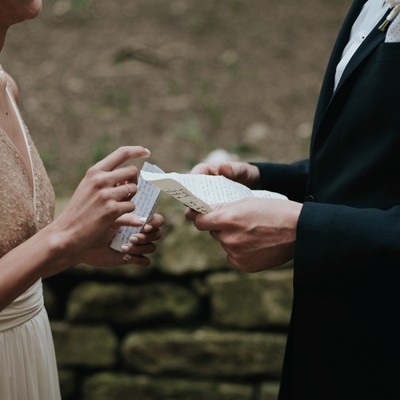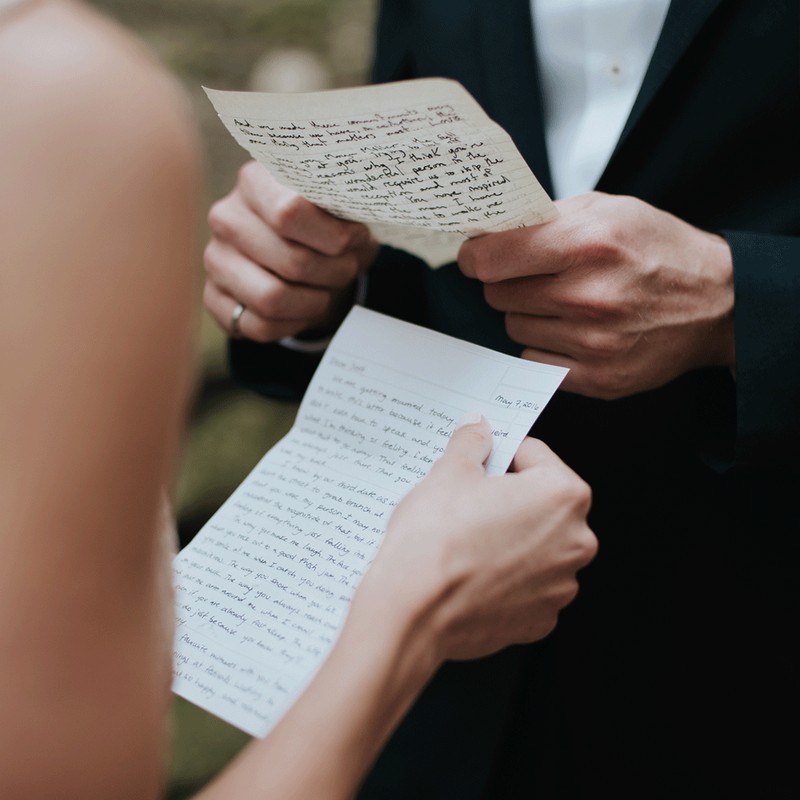
Writing Your Own Wedding Vows: The Dos & Don’ts
DO Remember Why Vows Are So Important
“The sentiments that your vows embody are the most important part of a wedding ceremony,” says Frances Cave, a celebrant at Fanfare Ceremonies. “They will serve as a reminder of the life commitment and uncharted – but definitely exciting – journey that lies ahead."
Celebrant Jennifer Patrice agrees: “The wedding vows are very important because they are the central part of the wedding ceremony. These are the lifelong promises a couple will make to each other in the presence of their loved ones.”
DO Know The Difference Between Religious & Civil Vows
“The phrasing of faith-based religious vows differs from civil vows,” says Frances, “but the sentiment will remain the same, and for some can represent not only the couple’s commitment, but also a celebration of their faith. The meaning behind vows is romantic, and civil marriage vows are often adapted from religious vows but must be free from any religious connotation.”
Jennifer confirms: “For a celebrant-led ceremony a couple can write their vows according to their beliefs, and if they are religious will write their vows looking to their faith to support them throughout their married life. If the couple are not religious in any way, they will convey the same sentiment without the words of faith.”
DON’T Forget The Legal Bit
“It’s important to note that in legal ceremonies, whether religious (in a place of worship) or civil (with a registrar), vows are pretty much set, as these words form the marriage,” says Jennifer. “In a civil ceremony you must include: ‘I do solemnly declare, that I know not of any lawful impediment why I (name) may not be joined in matrimony to (name)…’ In a religious ceremony you must also include: ‘…according to God’s holy law. In the presence of God, I make this vow.’ Once the legal words have been said, there is then some scope for the couple’s personalities to come into play.”
DO Make It Personal
“Although an intimidating prospect for many, the effort of writing your own vows is well worth it. Personal vows are from the heart, will be unique, and for the guests it’s a privileged peek into what makes your relationship tick,” says Frances. For Jennifer, “Couples should go for personal vows because only they know the true depth of their love for each other and the words needed to express that love.”
DO Know What You Should Include
“Genuine feelings are a good starting point when writing your vows. Include your thoughts on why you have chosen this person, what you love about them and what your dreams are for your life together. And don’t forget to say ‘I love you’ – it’s amazing how many people forget to include it in their vows!” says Frances. “Also include promises such as supporting your partner, perhaps with an example of a personal experience specific to your relationship. It’s nice to include a little funny story too – there’s nothing better than an anecdote in the wedding vows.”
Jennifer adds: “When it comes to writing vows, a couple should include something personal, but if parents or grandparents are listening, make sure it’s nothing too personal. You should think about your relationship and all that you have shared together, and include a promise for everyone to hear that you know will bring a smile or tears of emotion.”
DO Know What To Avoid
For Jennifer, “Writing too much can be a big mistake. Couples don’t want to run the risk of one of them having written a novel while the other has only written a paragraph.”
DO Seek Inspiration
“Looking at traditional vows can be really helpful when it comes to writing your vows,” says Frances. “Other helpful sources are books, song lyrics and poems.”

DON’T Leave It Too Late
“Everybody’s different and some people work better under pressure, but I would recommend allowing plenty of time to write your vows so you don’t feel rushed. Decide on the length and tone of your vows, then brainstorm together if you want to nail down some memories,” says Frances.
DO Just Start Writing
“Try not to force the writing,” says Jennifer. “Begin thinking about the vows organically. When ready, sit down in your favourite place with your favourite drink and let the words come naturally. I advise my couples to start by writing some pointers because, as they do so, other things will come to mind that they feel able to share.”
Frances agrees: “Start by scribbling down all the things you love about one another, then start probing a little deeper and take a trip down memory lane. Recount your story and before you know it the creative juices will be flowing.”
DO Try To Be Real
“The ability to laugh at yourself as well as your relationship serves as well in vow writing as it does in marriage. As well as being self-effacing, include anecdotes – this will make for the most natural and effective way of introducing laughter into the vows,” says Frances.
DON’T Try To Include Everything
“Don’t be tempted to try and fit every feeling you have into your wedding vows,” says Frances. “Decide together how long you are going to make them and also whether you want to keep them secret from one another until the wedding day.” Jennifer suggests: “There is no rule to this, but try to keep the length of vows to no more than 150 words.”
DON’T Forget To Rehearse
“Either ask a trusted friend to listen to your vows or practise reading them aloud to yourself,” advises Frances. “This is essential because, like a speech, vows require moments of pause and intonation. Be sure not to rush through them on the day – your guests will enjoy them much more.” Jennifer adds: “Read the vows out loud in front of a mirror when no one else is home. Do this a couple of times then sleep on them. Come back to them the next day and do the same thing again. If they are right, there will be no changes needed; if not, they can be tweaked.”
DO Think About The Detail
“It’s really nice when I see couples who have written their vows on pretty card rather than tatty pieces of paper. Most importantly, make sure they are written or printed very clearly so you’ll have no trouble deciphering them,” advises Frances. Jennifer agrees: “It may raise a laugh, but a screwed-up piece of paper doesn’t look very good in the photos!”
For more information and help with vow writing visit JenniferPatrice.com & FanfareCeremonies.co.uk.
DISCLAIMER: We endeavour to always credit the correct original source of every image we use. If you think a credit may be incorrect, please contact us at info@sheerluxe.com.

